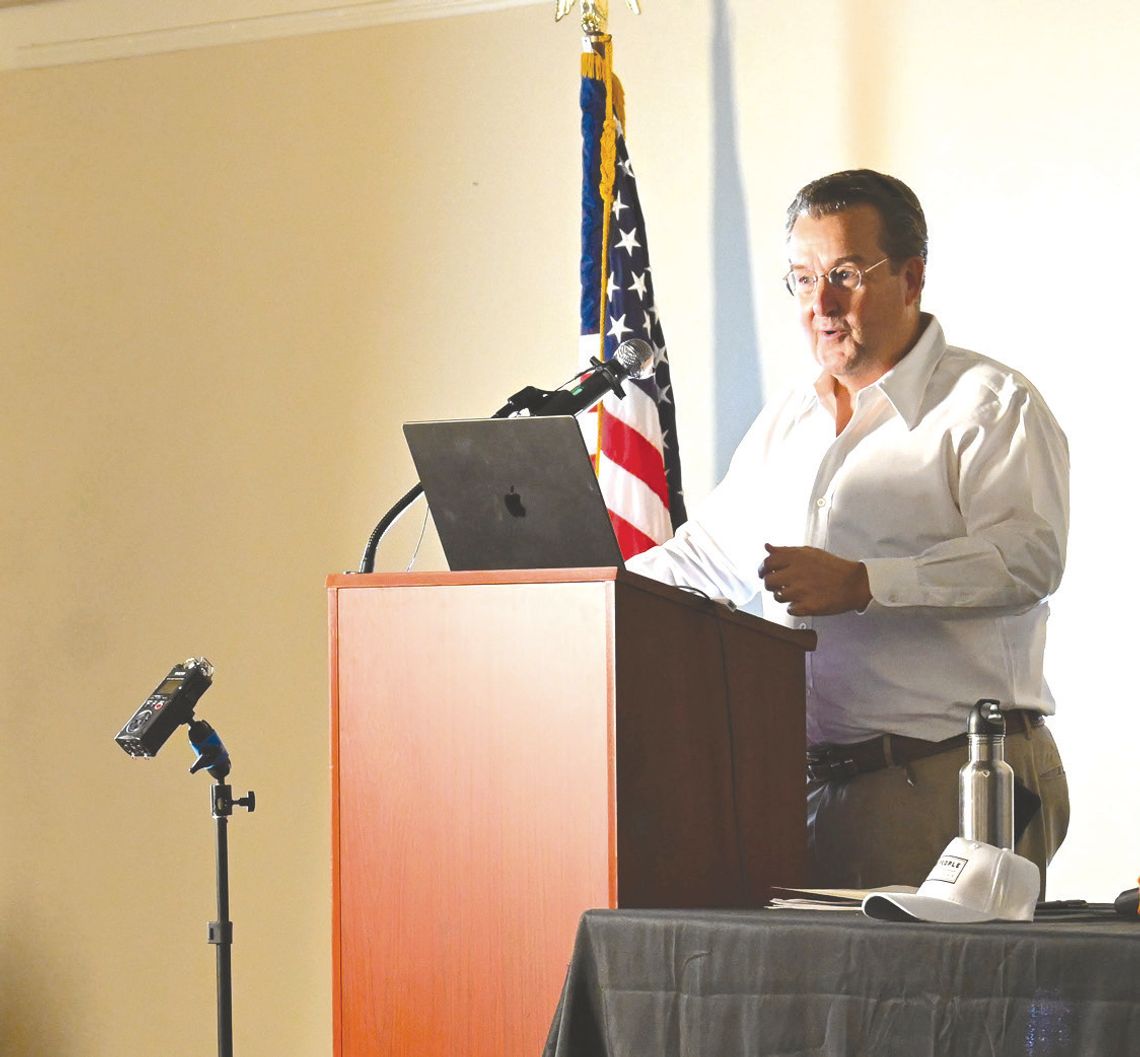In Part Three of this series about the dispute between Aqua Texas and the Hays Trinity Groundwater Conservation District, attorney Jeff Mundy of The Mundy Firm informed listeners of the legal issues that shape the dispute.
Mundy opened his remarks with what he considers the crux of the matter. “This company and the people who run it are asking the federal judge in Austin to rule that there is literally no authority to regulate groundwater in Texas... they’re saying that the legislation that created groundwater districts in the ‘50s is meaningless.”
Mundy went on to explain what he believes the ramifications of a judgment in favor of Aqua Texas would be. “This is not just an existential threat to Jacob’s Well, or Cypress Creek, or even Wimberley. What Aqua Texas is asking this judge to do presents an existential threat to the habitability to the state of Texas. I’m not exaggerating.”
He explained in further detail that the issue of depleted groundwater resources affects more than just the Wimberley Valley. “You can easily see on the TCEQ’s [Texas Commission on Environmental Quality] website that over 500 public water supplies in the state are facing shortages right now. There are over 30 public water supplies in outright system failure right now, with a complete inability to pump. All of this is happening while we’re protecting the groundwater. Think about what it would look like if the judge rules in Aqua’s favor.”
Does the Conservation District have the right to enforce drought restrictions?
In the federal lawsuit filed against the Hays Trinity Groundwater Conservation District in late 2023, Aqua Texas said they are an “investor-owned utility regulated by the Public Utility Commission” and that [the Conservation District has] “no authority to enforce drought restrictions and is obligated to serve its customers’ water needs.”
Mundy says the Groundwater District does have the authority to enforce drought restrictions. “In Texas Water Code Section 36.002, which Aqua says gives them the ownership right, they leave out another part, which says, “‘this section does not affect the ability of a District to regulate groundwater production, as authorized by 36.113.’” He further cited 36.113, “A district may require that a drought contingency plan be included in the permit or permit amendment application, as applicable under the rules of the district.”
Mundy pointed out that “The Texas Constitution deals with this issue” in Texas Constitution Article 16, 59 that deals with the conservation and development of natural resources, conservation, reclamation districts and other issues. “It is mandatory, according to our state constitution, that it must be conserved.”
He told the community that, “We think the answer is very clear in the statues that exist, but if for some reason the judge rules in Aqua’s favor, well then, we have a problem at the constitutional structural framework level.”
Who owns the water under a property?
Aqua Texas also stated in their suit that the Conservation District cannot disallow the permitting of new wells that Aqua drilled to provide water to customers. The suit read, “The Hays Trinity GCD has imposed a moratorium on permitting new wells, thereby preventing Aqua Texas from making use of its groundwater under the property that Aqua owns, even after Aqua drilled two new wells at substantial expense. Because Aqua filed initial well construction notifications with the District on August 24, 2022, the District was well aware of Aqua’s intent to use those new wells to provide water to its customers, Aqua Texas argued.
According to their lawsuit, Aqua Texas said the unlawful permitting moratorium was “arbitrary, capricious, and unconscionable.”
Mundy argued, “If being in the middle of a drought of record in the Hill Country isn’t a reasonable justification, if that isn’t good enough, then what is?”
Aqua Texas further maintained that “These groundwater ownership rights are further confirmed by the District’s governing statute — Chapter 36 of the Texas Water code, Section 36.002 — which clearly sets out that a landowner “owns the groundwater below the surface of the landowner’s land as real property.”
Mundy agreed. “That is a correct statement of law. Before the Legislature passed that law, the state of water law in Texas was the Rule of Capture: you pump water out of the ground, and once it gets to the top, then you own it. But before you pump it out, you don’t own it. That was the prior law. The Legislature decided to change this law. So now, yes, if you have water below your property, you own it.”
But, Mundy argued, “Aqua Texas left out the rest of the statute, Water Code 36.002, subpart b-1, which says “the groundwater ownership and rights described by this section do not entitle a landowner. . . to the right to capture a specific amount of groundwater below the surface of that landowner’s land.”
Are existing laws strong enough to protect our water?
Mundy summed up his remarks by saying, “The law of water evolved 120 years ago, when people didn’t understand the science. They didn’t understand that water on the top of the ground was related to the water under the ground. We know that now. We now know that if your neighbor pumps his well hard in one place, another well is going to go dry in a different place.”
“If the court rules in Aqua’s favor,” he continued, “then we have such a fundamentally insurmountable structural flaw in how we’re dealing with water protection, water allocation, the ability to regulate it so that it’s a sustainable and viable resource, that the whole framework needs to be thrown out and sent back to the legislature for them to sort it out. And that’s very well where we may be.”
In part four of this series, we will hear from David Baker, the executive director of the Wimberley Valley Watershed Association.







